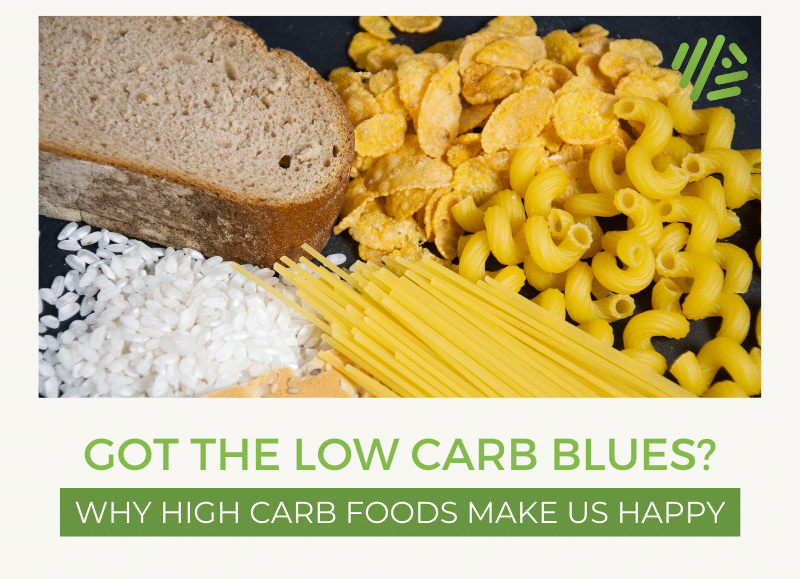Got the Low Carb Blues? Why High Carb Foods Make us Happy

Anyone who enjoys a good bowl of pasta know how delicious carbohydrate rich meals can be. Some would even say addictive.
I can only speak for myself, but if I get rolling on a pizza, you’re looking at a runaway freight train that can easily put back a whole pie and then some. I feel great for about 45 minutes after, then not so much. The lethargy that can set in after a high carb meal is part of what drives many of us to the low carb style of eating.
But is low carb all the time good for mood?
Maybe not for some of us. Despite what you may have heard, too much protein can actually inhibit the production of serotonin. By contrast, eating carbohydrates helps our brains make important neurotransmitters that regulate mood.
Why are carbs so addictive?
People get addicted to carbohydrate rich meals because eating carbs sets off a metabolic chain of events that literally makes us happy. Carbs light up our brain’s pleasure centers.
How?
Carbohydrate rich meals spike insulin levels, which helps our brains make serotonin, the feel good neurotransmitter responsible for sleep, mood, and even sex drive.
Before our research team evaluated peer reviewed literature, I expected to find that a diet high in animal protein is what gives us the greatest boost in serotonin because animal protein, and famously turkey, is very high in tryptophan, which is the amino acid precursor to serotonin.
Our bodies need tryptophan to make serotonin, it’s just that the level of tryptophan circulating in the blood doesn’t dictate the amount of tryptophan that makes its way into our brains. High protein meals raise our blood levels of tryptophan, but not serotonin in the brain, in fact, they can lower serotonin.
How is this possible?
Because amino acids work in concert.
Carbs help tryptophan reach the brain
Tyrosine, methionine, tryptophan and others, compete for uptake into the brain, and as it turns out, tryptophan is perpetually in last place.
On a level playing field, other amino acids, such as the amino acids we get from eating animal protein, will win out against tryptophan. But tryptophan has a trick up its sleeve. Where other amino acids are neutralized by spikes in insulin, which happens when we eat carbohydrates, serotonin binds to a substance called albumin.
Binding to albumin preserves tryptophan so it can journey into the brain and make serotonin, which makes us feel good.
We eat carbs, and our brains become better at making serotonin. In this way, eating crabs lights up the brain’s pleasure centers.
Consider this quote from Richard J. Wurtman’s paper titled the Effect of Nutrients on Neurotransmitter Release:
Thus, the ability of circulating tryptophan molecules to enter the brain is increased when plasma levels of the other LNAAs fall (as occurs after insulin is secreted) and is diminished when the plasma levels of the other LNAAs rise, even if plasma tryptophan levels remain unchanged. Since all dietary proteins are considerably richer in the other LNAAs than in tryptophan (only 1.0–1.5 percent of most proteins), consumption of a protein-rich meal decreases the plasma/tryptophan ratio (the ratio of the plasma tryptophan concentration to the summed concentrations of its major circulating competitors for brain uptake, principally, tyrosine; phenylalanine; the branched-chain amino acids leucine, isoleucine, and valine; and methionine). This, in turn, decreases tryptophan’s transport into the brain and slows its conversion to serotonin.
So, load up on the carbs?
Not necessarily. While going keto forever and never eating carbs isn’t healthy, eating a high glycemic diet rich in refined carbohydrates isn’t healthy either.
An excess of insulin brought on by too much sugar, bread, and pizza can and will cause inflammation in the body. 1
As a general rule, staying away from refined carbohydrates is a good idea for most people.
The main thing I wanted to draw attention to in this post is the happy place our favorite carbs take us to, at least for a time. Not everyone needs the same amount, but finding your carb sweet spot can be a thing of joy, literally.



